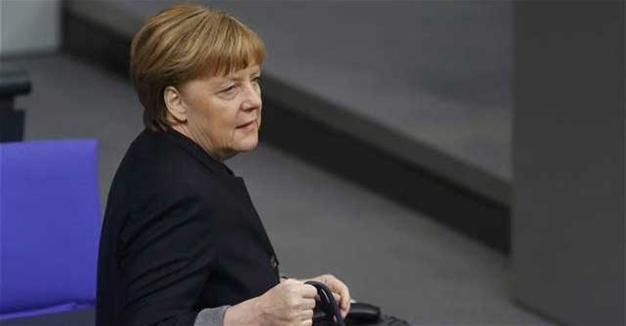Merkel ‘plans to visit Turkey’ next month
BERLIN
 German Chancellor Angela Merkel is planning to visit Turkey early next month, state-run Anadolu Agency quoted officials as saying on Jan. 20.
German Chancellor Angela Merkel is planning to visit Turkey early next month, state-run Anadolu Agency quoted officials as saying on Jan. 20. Merkel’s planned one-day visit to Ankara will focus on joint efforts to address the refugee crisis, cooperation in the fight against terrorism, as well as economic ties, a senior diplomat said.
The Chancellor is facing a tough election battle this year due to discontent in Germany about her open-door policy for refugees, which led to arrival of 890,000 asylum seekers in the country in 2015.
During her Ankara visit, she is expected to renew support for the EU-Turkey refugee agreement to stop irregular migration and highlight positive results achieved so far.
Meanwhile, Germany’s domestic spy agency chief, Hans-Georg Maassen, said his country “would not tolerate” Turkish intelligence operations within its borders, after Germany’s chief prosecutor launched an investigation into possible spying by Turkish clerics in the country.
Maassen said on Jan. 19 that Berlin was very concerned about recent developments in Turkey, as well as “influence operations” directed against the Turkish minority in Germany or Germans with a Turkish migration background.
“We cannot accept that intelligence agencies are operating in Germany against German interests, and that is why we protest,” Reuters quoted Maassen as telling reporters in Berlin.
The investigation, begun this week, followed a criminal complaint filed in early December last year by Volker Beck, a German lawmaker and religious spokesman for the Green party.
Beck said he filed his complaint after reports that Ankara had asked Muslim imams sent from Turkey to work for Ditib, Germany’s largest association of mosques, to provide information about followers of U.S.-based Islamic preacher Fethullah Gülen, which the Turkish government accuses of orchestrating the failed coup attempt.
Mehmet Görmez, the head of the Directorate of Religious Affairs (Diyanet), told German news outlets on Jan. 20 that it was “devoid of reason to name the efforts of religious workers or Ditib to try to safeguard Muslims from the wrong thoughts of organizations like FETÖ and Daesh,” according to the Doğan News Agency, referring to the Gülen movement and the Islamic State of Iraq and the Levant (ISIL).
The issue threatens to further strain ties between NATO partners Germany and Turkey.
Ankara has accused Berlin of harboring militants from the outlawed Kurdistan Workers’ Party (PKK) and far-leftists of the DHKP-C, which has carried out attacks in Turkey. German officials reject that claim.
Relations became even more strained after the German parliament voted in June to declare as genocide the 1915 killings of Armenians by Ottoman forces, and Berlin has criticized a security crackdown by Turkish authorities since a failed coup in mid-July, 2016.
Beck also criticized the prosecutor’s office for waiting so long to launch an investigation, and said it was unclear if possible suspects had left the country.
A spokesman for the prosecutor’s office said the probe was directed against unknown perpetrators because there was not yet sufficient evidence to target specific individuals.
German police last month arrested a 31-year-old Turkish man suspected of providing information on Kurds living in Germany to Turkish intelligence agencies.
In December 2016, Turkey had recalled the religious affairs attaché of the Turkish Embassy in The Hague, Yusuf Acar, after Dutch authorities accused him of gathering intelligence for the Gülen movement.
















